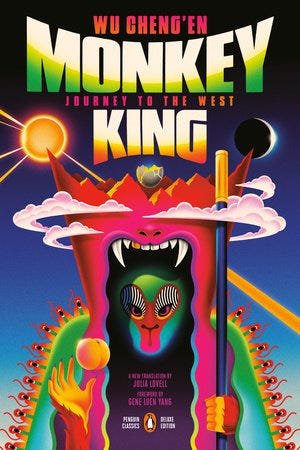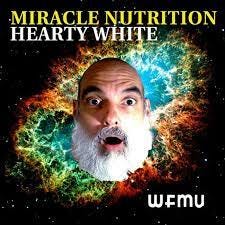Stories about Story Skeptics
"Most people say, 'Can't live without stories.' I can live without stories."
The Hall of the Monkey King miniseries from The Cosmic Library is now complete, fully and freely available wherever you go for podcasts, or over at Lit Hub. In the concluding episode, you’ll hear about comic capaciousness, and about Journey to the West’s life across centuries. As Julia Lovell says, “It's an open text, which is one of the reasons why I think it's had such a long afterlife.”
The Monkey King keeps the book open with his own skepticism of stories—political, religious, mythical stories. And in that spirit, this newsletter now pivots to the wider phenomenon of story-skepticism:
“Maybe they keep us fettered.”
In a recent and wonderful New Yorker essay, Parul Sehgal joins critics of popular notions of storytelling—including Peter Brooks—and she focuses partly on 1,001 Nights and Scheherazade. Sehgal writes,
Scheherazade has earned her rest, but she remains booked and busy, obsessively renamed and reclaimed. She is dusted off and wheeled out wherever the “magic of storytelling” is conjured, irresistible to any writer trafficking in “wonder” or “enchantment.”
Sehgal also tweeted, “Story skepticism animates some of today’s best, most blazingly original work.” In The Cosmic Library, we’ve heard some of this contemporary story skepticism from guests.
In our 1,001 Nights season, the WFMU radio artist Hearty White said:
I think stories are at best lies and at worst dangerous because they're lies and they purport to say something—and you'll notice that more and more we’re into story as a culture. You know: “Tell me your story.” My story? I beg your pardon? What do you want?
What you want is me to select little events and then condense them, interpret them, disregard other information.
Even if you tell a story and you say, “I'm going to tell it and be historically accurate,” it's impossible. Things are going to change to serve the narrative, because nothing is a narrative. Nothing is really a story—it doesn't have some kind of conclusion, and you don't know really how one thing led to another, necessarily. You're just grabbing a couple of things that you think might be contenders for causation.
But you're assuming a lot, and then you're making pronouncements, and then you're going, “The End.” So that's crazy.
It's a bad idea to reduce things to stories, and I know you’d say, “Oh, we'd be all floundering,” or you know, “Stories, keep us anchored.” Do they? I mean, they keep us anchored, and maybe they keep us fettered. Maybe they keep us tethered. There's other ways to do things, I'm sure.
“I can live without stories—or, well, I haven’t tried.”
One other way to do things: attending to sound, to music—on the page or maybe via podcast. In our season on the Hebrew Bible, the poet Peter Cole said: “Most writers who deal with the Bible are really interested in character and the famous stories. And I started out that way, but I outgrew that pretty quickly.” He elaborated:
Most people say, “Can't live without stories.” I can live without stories—or, well, I haven't tried. But what I can't live with is without music and without a certain heightened attention to sound. That's what really floats my boat. It's having to deal in a certain sense with the weight of the story—the beginning, the middle, and end of all those stories and kind of wringing them for morals—that's always put me off and kept me at a distance, even as I'm pulled back in all the time.
Which brings me to a main idea about The Cosmic Library’s method. When you follow tangents out of books, as we do on this show, you often shift away from their stories. And once you follow such a tangent even a short distance, you can look back at a book and notice how you were propelled by some collision between a story and something that’s not a story. That “something” can be the music of language, or the philosophical quandaries intimated by certain words, or a text’s resonance in cinema and the field of hydrodynamics. (This not-story might resemble the “non-being” mentioned by Virginia Woolf, quoted in Sehgal’s essay.) In any case, story and not-story mix together in productively combustible ways, launching you a great distance.
Thanks for reading, thanks for listening! Another Cosmic Library season is on the way. And I’m going to keep these newsletters going. They’ll show up about once or twice a month between seasons. That, at least, is my plan.
With gratitude,
Adam






